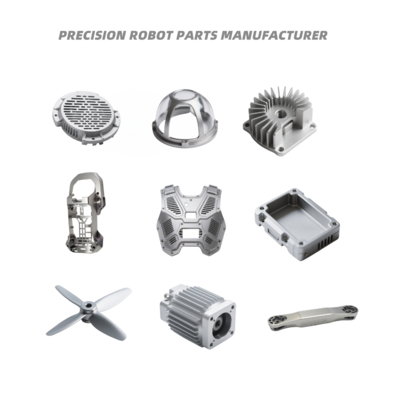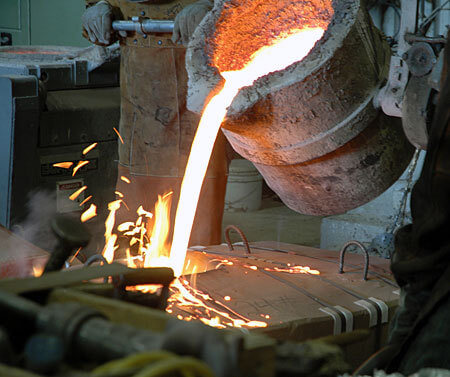How Foundry Services Enhance Manufacturing Efficiency and Top Quality in Industrial Applications
Shop services play a necessary duty in improving manufacturing performance and top quality across numerous industrial applications. By applying sophisticated metal spreading strategies, these solutions ensure elements are manufactured with precision and uniformity. This not only lowers lead times but additionally minimizes waste, promoting far better partnership between shops and makers. The effect of high-quality components on functional efficiency increases important concerns concerning the future of commercial manufacturing. What developments exist in advance in this evolving landscape?
The Role of Foundry Solutions in Streamlining Manufacturing Processes

In addition, foundries often give know-how in alloy advancement, enabling manufacturers to utilize advanced materials that boost item efficiency. The collaboration between shops and makers cultivates a better understanding of production requirements, bring about optimized processes and enhanced product layouts. By leveraging shop services, manufacturers can accomplish better flexibility, adjust to transforming market needs, and keep competitiveness in the industry. Generally, the role of foundry services is crucial in helping with an extra economical and effective manufacturing landscape.
Advanced Technologies in Shop Workflow
Innovative technologies are changing foundry procedures, significantly improving performance and precision. Automation plays a necessary function, with robot systems simplifying recurring tasks such as molding and product handling. Additionally, innovations in computer-aided design (CAD) and computer-aided production (WEBCAM) systems make it possible for shops to produce complex geometries with better precision and decreased material waste.
The assimilation of synthetic intelligence (AI) and device understanding boosts top quality control by keeping an eye on procedures in real-time and forecasting potential defects prior to they take place. Making use of advanced materials, such as lightweight alloys and composites, additionally enhances the efficiency attributes of actors items.
In addition, 3D printing technology is transforming prototyping and tooling, permitting for fast personalization and reduced lead times. Jointly, these sophisticated technologies not only elevate production performance yet likewise assure that the final items fulfill rigorous high quality standards, placing shops at the forefront of contemporary commercial applications.
Lowering Lead Times Via Effective Shop Practices
Efficient foundry methods play a vital duty in reducing preparations within production environments. By applying structured manufacturing processes and advanced scheduling methods, manufacturers can improve workflow and maximize resource allocation. These improvements not just increase output however likewise add to overall functional effectiveness.
Structured Production Procedures
Improving manufacturing procedures is vital for lowering preparations in the manufacturing market. Reliable shop methods, including optimized workflows and resource monitoring, play a critical role in accomplishing this goal. By minimizing waste and improving communication among groups, shops can greatly improve their functional effectiveness. The application of standardized procedures additionally adds to regular quality and faster turnaround times, making it possible for makers to react even more quickly to market needs. Additionally, the integration of advanced technologies, such as automation and real-time tracking systems, helps in determining bottlenecks and facilitating timely interventions. In general, an emphasis on structured production procedures not just speeds up lead times but additionally improves the overall competition of commercial applications, guaranteeing that products meet consumer assumptions successfully.
Advanced Organizing Techniques
Effective manufacturing procedures normally lead suppliers to explore innovative organizing techniques as a way to better minimize preparations. By utilizing advanced formulas and software program, factories can optimize workflows, straightening manufacturing schedules with demand forecasts and resource schedule. Techniques such as Just-In-Time (JIT) scheduling reduce supply expenses while making sure prompt material shipment, consequently boosting operational effectiveness. Furthermore, integrating real-time information analytics allows factories to expect possible delays and readjust schedules proactively. This flexibility not just improves procedures however also increases general efficiency. Furthermore, collaborative planning with distributors and customers can promote an extra integrated supply chain, further lowering preparations. Inevitably, these sophisticated organizing strategies equip factories to attain greater efficiency and remarkable quality in their production processes.
Making Sure Accuracy and High Quality in Metal Spreading
Ensuring precision and top quality in metal spreading needs a meticulous technique that encompasses every phase of the production procedure. This procedure starts with cautious layout and design of the molds, assuring they can withstand the liquified steel's temperature and stress. The option of high-quality basic materials is important, as impurities can endanger the final product.
Once the products are prepared, accurate temperature level control throughout melting and putting is essential to Check This Out achieve the preferred residential or commercial properties in the cast metal. Keeping track of solidification and air conditioning prices additional assurances dimensional precision and surface area finish.
Quality assurance techniques, such as non-destructive screening and assessment, are important to recognizing issues early in the process. Precision aluminum casting. In addition, utilizing knowledgeable employees who comprehend the subtleties of metal casting contributes significantly to maintaining high standards. Overall, these techniques collectively boost the reliability and efficiency of actors her response components in different commercial applications
Reducing Waste and Maximizing Source Use

Furthermore, recycling scrap steel within the foundry itself can substantially decrease waste, changing byproducts right into usable sources. Lean making concepts likewise add to squander reduction by improving processes and removing unneeded actions, leading to more efficient operations.
Moreover, routine upkeep of devices guarantees peak performance, preventing break downs that can lead to squandered products. By concentrating on these strategies, foundries not just lower expenses yet additionally add to sustainable methods, straightening with the expanding need for environmentally responsible production methods in commercial applications.
The Affordable Benefit of High-Quality Elements in the marketplace
High-grade parts supply a considerable affordable benefit in the shop market, where precision and longevity are vital. Producers that prioritize remarkable materials and craftsmanship can boost product performance and reliability, bring about enhanced consumer satisfaction. This benefit is specifically apparent in sectors such as auto and aerospace, where component failure can have tragic repercussions.
Premium parts typically result in lower upkeep prices and extended product life-spans, which can be appealing marketing factors for potential clients. As market demands grow for efficient and sustainable technologies, the focus on top quality comes to be also a lot more crucial. Business that buy top notch foundry services not only boost their production procedures however also differentiate themselves from competitors that may sacrifice quality for price savings. The commitment to top quality parts inevitably equates into a more powerful market position and long-lasting organization success.
Often Asked Concerns
What Kinds of Products Do Foundry Services Typically Function With?
Foundry services normally deal with steels such as light weight aluminum, iron, brass, and steel, along with numerous alloys. They likewise take care of products like composites and porcelains, satisfying diverse commercial demands and specifications in manufacturing procedures.
Exactly How Do Foundry Provider Effect Overall Supply Chain Management?
Shop services greatly improve supply chain administration by simplifying material sourcing, minimizing preparations, and ensuring regular high quality. Their capacity to provide customized services cultivates Visit Website cooperation among stakeholders, ultimately boosting general functional effectiveness and responsiveness in production.
What Industries Benefit Most From Foundry Services?
Industries such as auto, building, aerospace, and customer goods substantially gain from shop services. These industries rely on precision castings to satisfy stringent quality requirements and enhance their overall manufacturing processes and item performance.
Are Factory Providers Sustainable and Environmentally Friendly?
Foundry solutions can be lasting and eco friendly, especially when using advanced innovations and procedures - Aluminum Foundry. Developments such as recycling products, reducing discharges, and maximizing energy use add to minimizing their eco-friendly impact in commercial applications

How Can Firms Pick the Right Foundry Solution Provider?
Companies can select the right foundry provider by reviewing expertise, manufacturing abilities, top quality certifications, technology made use of, customer reviews, and sustainability techniques while guaranteeing alignment with their specific task needs and long-term business objectives.
Factory services play an essential function in enhancing manufacturing performance and top quality across numerous industrial applications. The cooperation between makers and foundries promotes a far better understanding of manufacturing needs, leading to maximized procedures and enhanced product designs. Effective factory practices play a crucial function in reducing lead times within production atmospheres. By using sophisticated algorithms and software, factories can maximize workflows, lining up manufacturing schedules with need projections and resource accessibility. Companies that invest in top quality shop solutions not just boost their production procedures yet additionally differentiate themselves from rivals that might sacrifice top quality for expense savings.